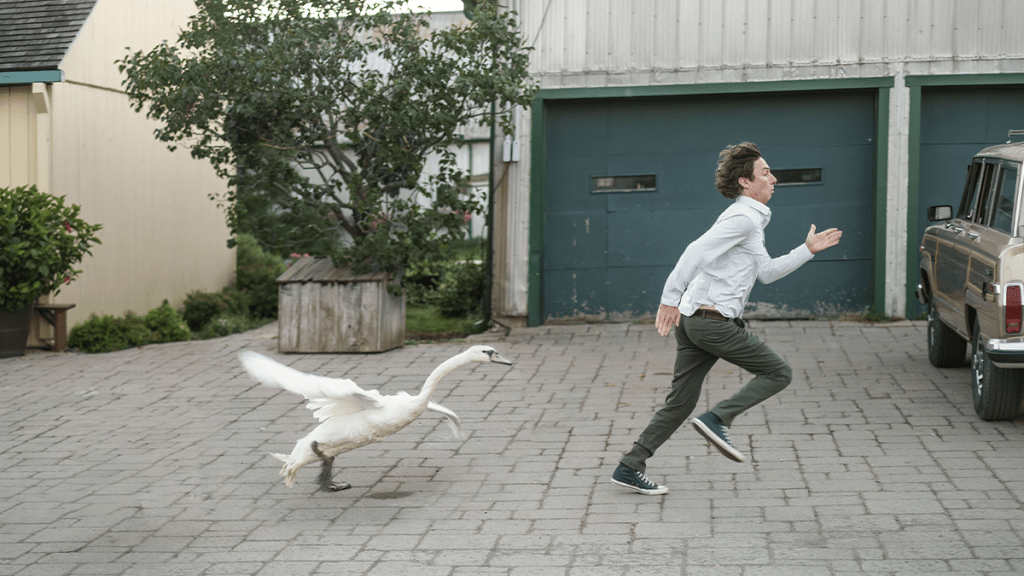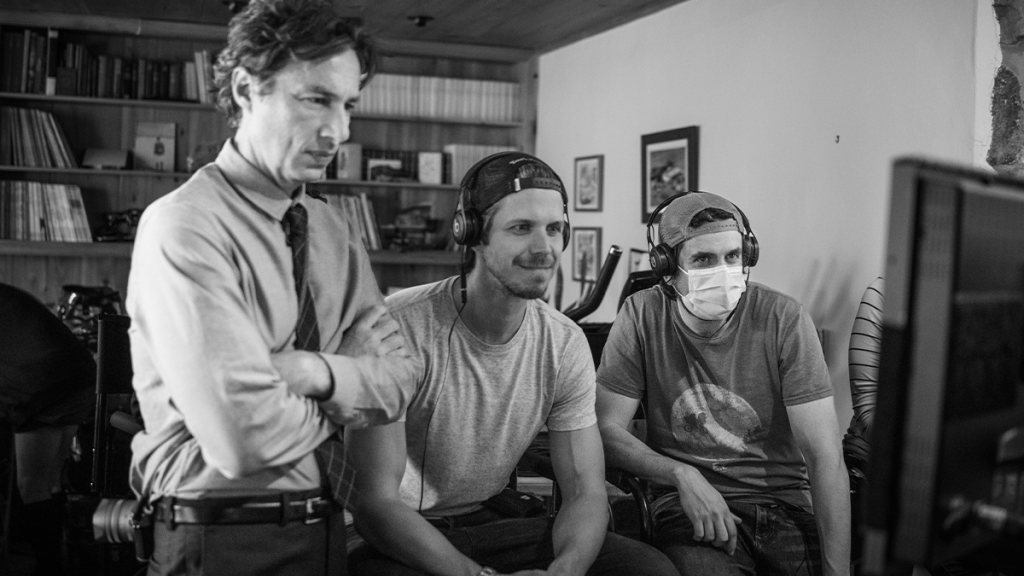ComingSoon Editor-in-Chief Tyler Treese spoke with French Girl co-director and co-writer Nicolas Wright about the Zach Braff-led romantic comedy. The filmmaker discussed creating the film in Quebec and getting the rights to show a clip from Bloodsport. French Girl is set to release in theaters on Friday, March 15 and digitally on Tuesday, March 19.
“Zach Braff, Vanessa Hudgens, and Evelyne Brochu star in this heartwarming romantic comedy,” reads the movie‘s synopsis. “Gordon, a hopeless romantic, finds his proposal plans are thrown into chaos when his girlfriend is swept away to Quebec by a job offer at the Fairmont Le Château Frontenac from her ex, a sophisticated celebrity chef. Determined to keep their love alive, Gordon leaves Brooklyn for her hometown, only to find himself hilariously out of his depth in attempting to charm her hard-to-impress, French-speaking family.”
Tyler Treese: You have a great cast assembled in French Girl. Your lead actor, Zach Braff, is also a very talented director and is known for his comedy. Is his experience as a director noticeable when working with him, or does he just feel like any member of the cast?
Nicolas Wright: No, that’s a really good question. It was immensely helpful. Like, from our first conversations, he has such a strong film acumen that is unique to actor-directors because they approach something with a much more bird’s eye view. A lot of actors are really myopic about their own sort of performance — which is their job, and they should be — but what’s helpful occasionally is if you have someone like Zach, who’s a writer-director in his own right.
When you look at the character, there are certain things that are meant to be tracking throughout the film, whether it’s jokes or character beats, emotional beats — he’s very good at understanding where threads maybe are getting lost or dropped and where we need to pick them up again, how to amplify those things, and again, that’s more of a script/story strength, which comes with experience in filmmaking.
And he was extremely helpful with that, from day one and our first meetings with him on through pre-production and into production. He was really, really good at saying, “Guys, I think we’re losing this. I think we have to let the audience remember this moment here. Let’s amp this up here.” So it was just nice to have him on set and to have him there during our first feature film debut. It was nice to have that guy around as a third eye, which was amazing. And Luc Picard, the actor who plays the father in the film, is a French-Canadian filmmaker — one of the best out of Quebec in his own right. So we had a few on set, which were, again, just these quiet presences that gave us a little extra confidence when we needed it.
One thing about Zach’s performance is that he knows the right delivery and the way to play into the humor. How much easier does it make those scenes where you don’t have to worry about the execution because he’s such a pro and so experienced in that regard?
That guy is such a comedic ninja and his rhythm is flawless. We were so lucky with the cast, and again, I say this a lot, but I think 80% of directing is casting. And if you cast the right people, you really don’t have to do much on the day. You know that they’re going to deliver the goods and you just have to sort of nudge them one way or the other. Zach just made it so easy for us, and we knew we had an absolute consummate professional and he just makes it sing.
He’s got this sort of amazing neurotic, comedic energy that he can channel so effortlessly. God, he had us in stitches. He is also just a fantastic improviser as well, so there are a lot of jokes in there that we just had to leave in because they were just too delicious to not do that. It’s just such a blessing to have a guy like that in your film because he elevates our extremely mediocre dialogue and makes it much better. [Laughs].
Another highlight of French Girl is William Fichtner, who plays Zach Braff’s dad. He’s kind of on the periphery, but every single time he pops up, it was just so hilarious. How was it working with him?
Oh man, he is a brother, man. We got to know him on the sequel to Independence Day and became fast friends. When you’re shooting for five months in Albuquerque, you get to know people. And boy, are we glad we got to know him. He is just a dude — a brother from another mother, as they say. I think he was pretty much a very early inspiration for us to write this part. We certainly had his voice in mind from the very beginning.
And God, we’re so grateful that the gods of cinema just aligned schedules. A.) that he liked it when he read it, and B.) that his schedule allowed him to come and squeeze us in because he is a very in-demand, busy man. His only one condition, speaking of beards, was, “Guys, I want to do this. It’s going to be f—ing great. I’ve got to have a beard!”
We were like, “All right, let’s do it. I think we can make that work.” Because at the time, he didn’t have a beard. He’s got one now, but he didn’t have one at the time and we were shooting in a couple weeks, and he couldn’t grow one that fast. We fashioned a beard and it was perfect. I think our hair and makeup people did a fabulous job and he it gave him that extra raggedy sort of “crazy man” look. [Laughs]. He really wanted to get it, and yeah.

He’s so funny and a lot of the humor comes from Zach meeting this French-Canadian family of his girlfriend. How was it making sure each character had something that leads to comedy?
It was a long … I mean, a lot of that happened in the scripting. We worked on the script for a long time. It was a really slow gestating process over many years. All those sort of details and nuances just gradually came up year after year. Just add another layer, add another layer, and it just sort of happens slowly over time. Again, I think, I tell a lot of writers this — the best thing you can do if you’re a writer is to write something, get it out, get it out of your system, and then put it away. Put it away for as long as you can tolerate it, and then go back to it. You’re going to see it with fresh eyes and you’re going to add so much more to it.
It’s a really tough discipline. But man, did it pay off in the script, because we were able to add all these nuances and those things … we took all these elements from Quebec that we love. Quebec has a strong sort of passion for UFC fighting.
We’re like, “Well, let’s give that to junior. There’s also, obviously, the food culture in Quebec is massive and that’s why we set it in the culinary world. So let’s give that to Sophie. And agriculture here is massive. There’s so much agriculture that happens here, and lamb chevre — all that stuff is very popular in Quebec. Let’s put that on the family farm. Let’s have them do lambs and all that stuff. All these things come from our cultural experience growing up in Quebec, then just took time to infuse every character. Cigarettes are really big here, so let’s give that to the sister where she’s a new mom but is dying to smoke a cigarette. We had to cut some of that out just for other reasons.
But there’s a whole storyline through the film where she was vaping and then she was always afraid of getting caught. In the end, you see her smoking. But yeah, there was a whole sort of thread about like, “You can’t smoke. You can’t smoke.” They love their cigarettes here in Quebec.
I did want to ask about French Girl’s MMA scenes because those are really fun and you mentioned, you know, Quebec being very big into MMA, like Georges St. Pierre.
Yeah, he’s a legend here.
How did you actually get fighters for those sequences in the cage or were there the actors?
Lee Villeneuve is the big fighter that Junior fights and he’s a real fighter. He trains fighters more now than he fights, I think. But he’s absolutely a real fighter. Then our stunt man, Stéphane [Lefebvre], he said he had the idea. He’s like, “Hey guys, I know there’s a fight scene that happens when they walk into the bar, but can they be women fighters? Because I’ve got a bunch of women fighters who were awesome.” And we were like, “Yes, that’s such a great idea. Absolutely.” And we were like, “It should be the most violent, brutal fight of the movie.” That’s why we had the arm break and all that stuff.
Those two are real fighters and, boy, I would not want to get in trouble with either of them because they could kick my ass. They were fantastic and so much fun to work with. Then, of course, we have this cameo from Georges St. Pierre, who is so sweet and so nice to give us his time to come in and just have a fun little scene with Antoine Olivier Pilon. And the two of them are great. It was just perfect. It was a nice cultural wink to have him in the movie and a great ending for Junior’s story to meet his hero at the end.
One of my favorite scenes in French Girl is the bonding between Zach Braff’s character and the son over Bloodsport. Was there any challenge getting the footage or how did that come about?
Yes. Oh my God, you’re asking all the right questions. It took forever. It took forever because not only do you have to get the rights to the film — which is one thing — and I think it was MGM that made it at the time, but you also have to get the rights of the video game that appears in the film. You have to get the music rights to the video game music. You have to get every actor to sign off. And we had to choose certain parts based on who was in the frame, because you have to get all the actors to sign off. And so Bolo Yeung is the famous fighter from that, he was M.I.A. — we couldn’t find him.
So we spent months just trying to track him down in Thailand. I think, finally … Jean-Claude Van Damme was the first one to sign off. He was so nice. And he was like, “Yeah, of course I’ll support this.” That was not a problem. But honestly, finding Bolo took, I think, three or four months. It was down to like a week before we had to deliver the movie to Paramount, and we had no backup. We had no way to fix the problem if we couldn’t legally get it all signed off. So we were just so lucky that finally some intrepid agent somehow through word of mouth found him in the jungle somewhere. [Laughs]. I don’t even know. But we got the paper signed and everything was great.
But man, that was a lot of work. I don’t recommend that to other young filmmakers, to try and put ’80s films inside of your movie. It’s a little tricky to track people down these days. [Laughs].

I want to ask about working with Vanessa Hudgens, because she has such a fun character here. She’s very brash, but she’s also so naturally charismatic. How was it working with her on that character?
She is a dream to work with. She’s so low-key and game for anything, and to get her to sing in the movie, I mean, what a joy and how lucky are we that she did that? It’s funny, because at first, we were going to put in some kind of hip hop track or some sort of more well-known track, but A.) that costs money and B.) It’s not that funny. Co-writer, co-director James A. Woods, is an accomplished musician in his own right. But as a lark, once he wrote a Christian rock song and we were like, “Wouldn’t it be funny if that’s what she wrote?” So he sent her the song and she was right away, like, “Yes, I want to do this.”
Even to do it so brazenly and to sing well, but a little too well, but a little badly, again, speaks to her talent as a musician and also rhythmically, because she is a musician that translates extremely well into comedy. Comedy’s all about timing and rhythm, so I hope she does more comedy. I know she does the Princess Switch movies on Netflix, which is a huge testament to her talent where she has to play like three characters in one movie, but I hope she continues down that path. We had a blast with her doing comedy. She was just so playful, so fun, and again, just the nicest human being, which is all you can really ask for — to work with really nice people. It makes the whole thing much easier. But yeah, I really hope that she does more comedy, because she’s really funny.
I just wanted to ask about your working relationship with James A. Woods and how you guys play off each other. You mentioned going back and getting a fresh eye on scripting and that sort of thing. I imagine having two people makes that process even easier. Can you speak to playing off each other?
100%. I think having a writing partner is so important, because right away, there’s a sounding board built into the process. The fact that we both started as actors helps us iron out dialogue very quickly because we just perform it back and forth with each other. And you can right away hear if it sounds stilted or weird. So you’re workshopping it with actors as you write, which is a very, very helpful process. But yeah, we started out as actors and developed a chemistry on screen before we started writing. Then we said, “Oh man, why don’t we try our hand at writing?” And then, slowly but surely, we started writing together. I think in about 2009 we wrote a pilot, which never went anywhere, but then we wrote another pilot that we shot ourselves and then ultimately sold to Comedy Central. That didn’t go because there was a regime change.
And then in our crushing depression, we just wrote an action film that we then sold to Roland Emmerich . And then that same week, we sold a movie to Sony and got the Russo brothers attached to produce. We’ve had such a crazy wild ride. People keep asking, “You guys wrote the sequel to Independence Day, and then you wrote and directed French Girl — can you connect those dots for me? Because it’s a weird business.” But it’s just a weird business where you just do as you never know what’s going to go. The truth is, we wrote this movie way before we got involved with Independence Day, and again, we took time and then we put it aside and we got busy with other things, and then we brought it out again. Then we put it aside and we brought it out again.
And all these projects happen in their own times. You really can’t control anything. It’s literally a Plinko board where you drop something in and then you see where it falls and maybe it gets made and maybe it doesn’t. But, you know, the good thing as well about having a writing partner is it’s a lot like going to the gym with a buddy or a spotter. You have somebody to vent with and to push you and to fight the good fight together is, psychologically, a massive benefit, for sure.










